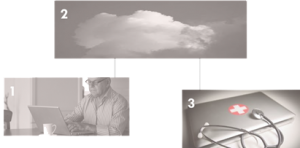Earlier and better screening for PTSD
Mental health issues are placing a constantly increasing strain on our society. As a consequence, medical care-givers, insurers, employers, regional authorities and, of course, the public feel an increase in organisational, psychological and financial pressure. Early diagnosis is required. Because the sooner an alarm is raised, the greater the savings in the future. The PTSD screener makes it possible for everyone, patients and organisations, to detect a post-traumatic stress disorder much sooner. The PTSD Screener was developed for screening and diagnostic support in cooperation with The University of Twente.
New weapon in the fight against damage caused by PTSD
Every year, a great deal of money is consumed by healthcare and the loss of productivity caused by mild or moderate forms of psychological conditions such as depression and post-traumatic stress disorders. However, new innovative diagnostic technology is still in its infancy. Diagnosis does not always take place using questionnaires and interviews. The PTSD Screener works with mathematical algorithms and text mining, which makes it a pioneer in the fight against the enormous damage inflicted by PTSD.
We must not wait with PTSD
Post-traumatic stress disorders (PTSD) can occur if a trauma is not effectively processed. Although the symptoms are, in strict terms, a normal reaction to threat, they cause a great deal of damage to sufferers and society. The list of physical and psychological consequences of PTSD is long and includes increased irritability, poor sleep patterns and nightmares, recollections, dissociation, a numbed response to the environment and negative moods. Certain professional groups have an increased risk of PTSD. The longer a post-traumatic stress disorder goes undiscovered and untreated, the greater the damage to the patient and society. Timely detection of PTSD is therefore a pure benefit and necessity for everyone involved.
Innovative application of ‘text mining’: the PTSD Screener
The PTSD Screener was developed on the basis of a number of elements, including the scientific underpinning of Qiwei He. Her dissertation ‘Text mining and IRT for psychiatric and psychological assessment’ was distinguished with the ABAS Dissertation Award in the Netherlands (2014) and the American Psychological Association (APA) Quantitative Psychological Methodology Dissertation Award (2017). This innovative approach to diagnostics led to the development of the PTSD Screener, a joint venture between Pronos and The University of Twente.
The effect of the PTSD Screener
The PTSD Screener ensures early detection of post-traumatic stress disorders. This prevents further deterioration. The PTSD Screener is based on the fact that people unconsciously reveal their mental state with their choice of words. The participant produces the ‘ego document’, a text of 15 to 20 lines. The PTSD Screener analyses this text and searches for signals that the participant has PTSD. We call this text mining. There are two options for every participant: there is very probably no PTSD, or there is very probably PTSD. The latter group must be examined by qualified physicians before a definitive diagnosis can be formulated.
Can your organisation benefit from the PTSD Screener?
The PTSD Screener was developed for various users. For companies and organisations with employees in trauma-sensitive functions, and also for health and safety organisations, insurers, psychologists, company doctors and regional mental healthcare providers. Prevent suffering, long-term absenteeism and high costs with early detection.







